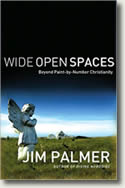Wednesday, November 3
Now this is eternal life: that they may know you, the only true God, and Jesus Christ, whom you have sent.
—John 3:17
NIV
I began writing books later in life and didn't particularly pay a lot of
attention in my high school and college English and grammar classes. A friend recommended I get a copy of The Elements of Style by William Strunk and E.B. White, a seminal book on the fundamentals of writing. I was prone to shifting tenses in my writing and so paid particular attention to the instruction regarding keeping to one tense, "In summarizing the action of a drama, use the present tense."
The story of God's redemption of the world is certainly a drama, but I often struggle keeping it in the present tense. The life, death, and
resurrection of Jesus Christ can sometimes seem like historical events, which I venerate and celebrate as central to my faith, but nonetheless regard as in the past. The Bible tells the story of God's relationship with humanity, and I am given a front row seat, but that was then and this is now.
My faith also understands the drama of God pointing forward to a glorious future. The hope of heaven, the end of suffering, and the culmination of God becoming all in all are future realities I look forward to with great expectation. God has done so much and I believe there is more still he will do. "Has done," that's past tense; "will do," that's future tense—hmm—what about—present tense?
What if the most decisive thing happening in the drama of God is not what did happen or what will happen, but what is happening? I once thought of "eternal life" as pertaining to the afterlife, but Jesus defined it as "knowing God," which sure sounds like the herelife. Maybe the Bible isn't so much a story about people of the past, but is really my own story once I understand myself in light of all its characters.
Jesus' resurrection took place over 2000 years ago, but isn't he living within me now? Perhaps God wants to offer love, healing, peace, and freedom to a suffering world through me—now; after all aren't we the "body of Christ" on earth? What are we waiting for?
In all sorts of ways we live in the past and the future, but not the
present. The following story is on the kitchen wall of St. Benedict's
Monastery:
I was regretting the past and fearing the future.
Suddenly God was speaking,
"My name is 'I am.'"
I waited. God continued,
"When you live in the past, with its mistakes and regrets,
it is hard. I am not there.
My name is not 'I was.'
When you live in the future, with its problems and fears,
it is hard. I am not there.
My name is not 'I will be.'
When you live in this moment, it is not hard.
I am here.
My name is 'I am.'"
Maybe E.B. White's grammar recommendation applies to life in God: "use the present tense."
Thank you God that the peace, healing, and freedom you desire for me is available today. Amen.
These Signposts originally appeared on explorefaith in 2006.




